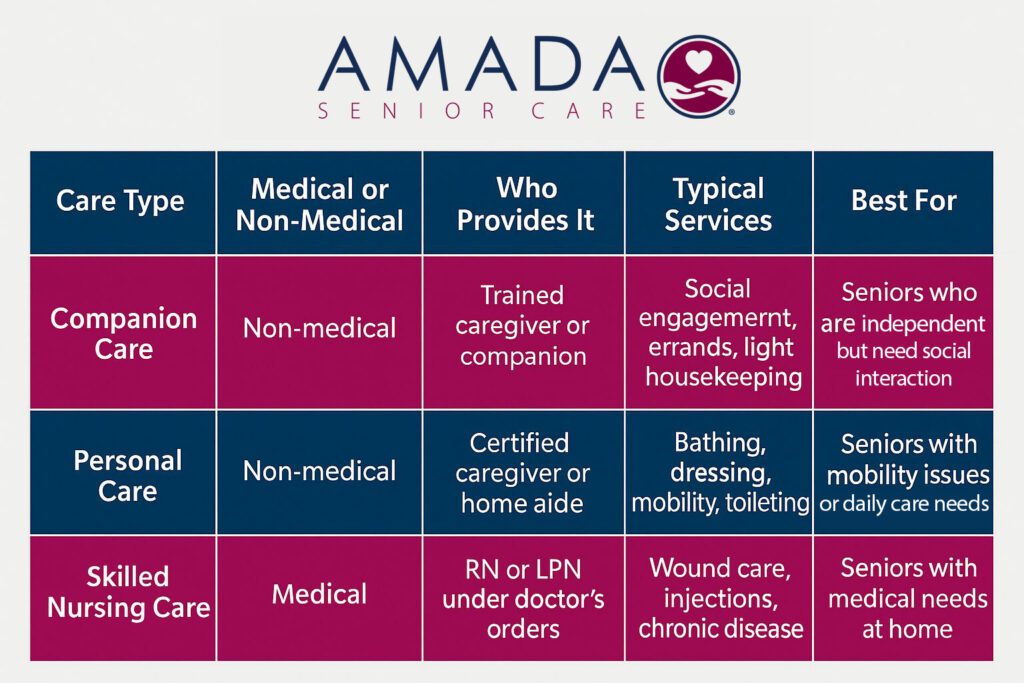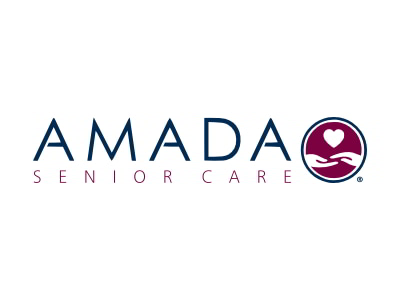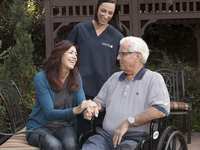- Categories :
- More
Personal Care and Skilled Nursing Care: How Do They Differ?

Understanding In-Home Care Options During Nurses Week
Nurses Week that started on Tuesday, May 6th, and ends this Monday, May 12th, is a time of gratitude and recognition for the licensed nurses on the front lines, personal care providers supporting everyday life, and the countless families making care decisions for elder loved ones. For all of us at Amada Senior Care, this week lets us pause and appreciate the incredible caregivers who serve older adult and senior clients every single day.
Families often come to us asking: “What kind of in-home care is right for my loved one?”Whether your loved one needs a compassionate caregiver to help with daily activities or to offer a friendly face to share a meal with or a licensed nurse to provide medical support, understanding your options is key.
Making the best decision for a loved one depends on knowing the key differences between the three types of in-home care: Companion Care, Personal Care, and Skilled Nursing Care. Each plays a different, yet equally important, role in helping older adults live comfortably and safely at home.
Types of In-Home Nursing Care: Companion, Personal, and Skilled Nursing
1. Companion Care: Comfort and Connection
Companion care is the most basic level of in-home support. It’s non-medical and non-hands-on—focused entirely on social engagement, emotional support, and light assistance with daily routines.
Services may include:
- Friendly conversation and emotional companionship
- Playing games, reading, or watching TV together
- Light housekeeping and laundry
- Grocery shopping and meal preparation
- Transportation to appointments, errands, or outings
- Help with organizing mail or managing a calendar
Companion care is ideal for seniors who are mostly independent but may feel isolated, lonely, or need help with minor tasks. Companion care provided by a trained caregiver or a home care aide is a wonderful choice for boosting mental well-being and keeping loved ones connected, particularly when families live far from their senior loved ones.
2. Personal Care: Hands-On Help for Daily Living
In-home personal care goes a step further, offering non-medical, hands-on support with activities of daily living (ADLs). Caregivers (also known as home care aides) are trained to help with physical needs while respecting privacy and independence.
Services typically include:
- Bathing, grooming, and dressing
- Assistance with toileting and incontinence care
- Mobility help (e.g., walking, transferring from bed or chair)
- Meal preparation and feeding assistance
- Medication reminders
- Light housekeeping and safety monitoring
- Transportation, running errands
- Escort to doctor’s appointments and other engagements
Personal care from a trained caregiver is a non-medical solution for seniors who are struggling with physical tasks or are recovering from an illness or hospital stay. Personal care is essential for those with mobility challenges, dementia, or chronic conditions that affect daily life.
At Amada Senior Care, this is at the core of the non-medical caregiving services we provide—care that supports aging in place with compassion and dignity and keeps older adults and seniors safe and independent living at home. Our caregivers are trained, compassionate professionals who provide one-on-one attention to help seniors feel safe, respected, and engaged in their daily lives
3. Skilled Nursing Care: Medical Care at Home
Skilled nursing care is licensed medical care provided at home by a Registered Nurse (RN) or Licensed Practical Nurse (LPN). It must be ordered by a physician and is usually short-term—meant to treat or manage a medical issue. They work under a doctor’s supervision and are equipped to respond to urgent medical needs.
Skilled nursing facilities, rehabilitation centers, hospitals, and at home through home health agencies (with a doctor’s referral) are the typical environments for skilled nursing care.
Skilled nursing services include:
- Monitoring vitals and health status
- Administering injections or IV therapy
- Wound care and post-surgical care
- Managing chronic conditions (e.g., diabetes, heart disease)
- Medication administration (not just reminders)
- Teaching caregivers how to perform certain medical tasks
Seniors who need professional medical oversight, especially after surgery, during illness, or when managing a complex health condition. Care may be delivered through a home health agency and is often covered by Medicare if medically necessary.
A few non-medical home care agencies like Amada NorthShore in Skokie, IL and Amada Louisville in Louisville, KY are state-licensed to provide nursing care.
How Personal Care, Companion Care, and Skilled Nursing Care Work Together
Many older adults and seniors benefit from a combination of care types:
- A senior might receive skilled nursing for wound care after surgery but also need personal care for bathing assistance.
- A mostly independent older adult might receive companion care for social support and meal help a few days a week.
- Over time, needs may shift—and the professional care team adjusts the senior client’s care plan accordingly.

At Amada Senior Care, we specialize in non-medical care, including companion and personal care, and often collaborate with home health providers to ensure seamless support across all levels.
Insurance and Cost Considerations for Personal Care, Companion Care, Skilled Nursing Care
When prescribed by a doctor, skilled nursing care is often covered by Medicare, Medicaid, or private health insurance. However, coverage may be limited in duration and scope, depending on the policy.
Personal care can be privately paid by the family or senior client or covered through a family’s long-term care insurance (LTCi) plan. If the senior is a veteran, certain VA benefits such as the Homemakers and Home Health Aide benefit offers partial coverage for veterans who qualify.
Many families appreciate the flexibility and affordability of non-medical care as a long-term solution for loved ones who are aging in place. As experts in long-term care insurance claims management and veterans benefits, Amada Senior Care advisors are happy to consult with families about their LTCi policies and with veterans about their VA benefits.
Not Sure What Kind of Care Your Loved One Needs?
You’re not alone. Our friendly team of Amada Senior Care advisors is here to help families:
- Learn about the various care options available
- Build a personalized care plan
- Adjust services as needs evolve
- Understand their Long-Term Care insurance policies
- Help senior veterans understand VA benefits that help pay for home care
CLICK HERE to find an Amada office near you or call 866-752-1961 to learn more about caregiving services, senior housing options, and funding solutions.
Giving Thanks to Skilled Nurses, Personal Caregivers and Companions
Whether it’s a nurse performing a critical medical task, a caregiver providing assistance at home, or a companion offering a listening ear over lunch—all care matters. Each of these care professionals play a vital role in the well-being of older adults and seniors who choose to age at home. This Nurses Week, we at Amada Senior Care give our heartfelt thanks to all skilled nurses, personal caregivers, and companions who bring joy, dignity, and security to the everyday lives of seniors and their families.
















